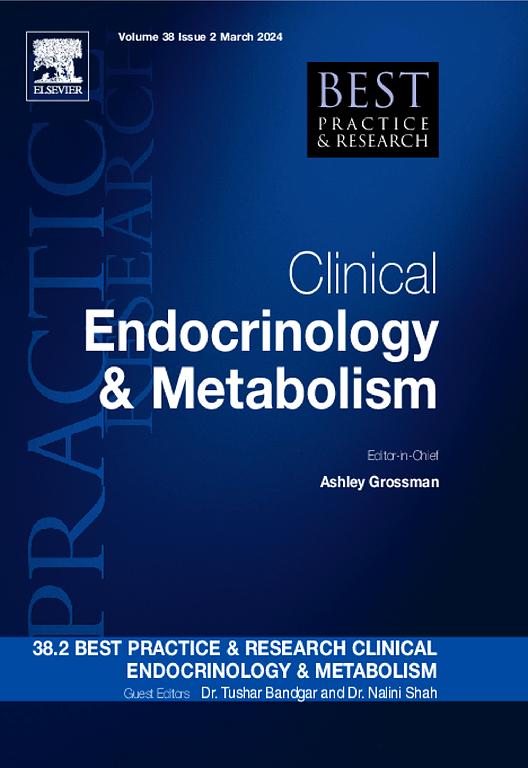评估嗜铬细胞瘤和副神经节瘤临床特征的最新进展。
IF 6.1
1区 医学
Q1 ENDOCRINOLOGY & METABOLISM
Best practice & research. Clinical endocrinology & metabolism
Pub Date : 2024-12-01
DOI:10.1016/j.beem.2024.101953
引用次数: 0
摘要
嗜铬细胞瘤和交感副神经节瘤(PPGL)是一种罕见的神经内分泌肿瘤,起源于肾上腺髓质和肾上腺外交感副神经节的嗜铬细胞组织。由于嗜铬细胞瘤的临床表现多种多样,可能与其他各种疾病相似,因此它被称为 "伟大的模仿者"。随着时间的推移,PPGL 的临床表现也在发生变化,从无症状或死后诊断转变为更频繁的偶然发现或通过筛查确诊,死后鉴定现已很少见。临床评分系统的开发提高了对 PPGL 高危患者的识别能力。值得注意的是,血压正常的 PPGL 患者比例从 15% 到 40%不等,因临床环境而异。尽管这种肿瘤名声在外,但 PPGL 却是导致抵抗性高血压的极为罕见的原因。嗜铬细胞瘤危象的治疗已取得进展,有几类药物可用于治疗。然而,妊娠期嗜铬细胞瘤仍是一个令人担忧的问题,它与孕产妇和胎儿的高死亡率有关。此外,PPGL 还可表现为罕见疾病,包括儿茶酚胺诱发的心肌病、库欣综合征和膀胱嗜铬细胞瘤。鉴于这些不同的表现形式,提高对 PPGL 的认识并及时识别对于及时诊断和治疗,最终改善患者预后至关重要。在本文中,我们将深入分析 PPGL 的各种临床表现,强调其复杂性以及相关的诊断和治疗策略。本文章由计算机程序翻译,如有差异,请以英文原文为准。
Update on clinical characteristics in the evaluation of phaeochromocytoma and paraganglioma
Pheochromocytomas and sympathetic paragangliomas (PPGL) are rare neuroendocrine tumors originating from chromaffin tissue of the adrenal medulla and extra-adrenal sympathetic paraganglia. Historically, many of these tumors were diagnosed postmortem, earning pheochromocytomas the moniker "great mimic" due to their diverse clinical manifestations that can resemble various other conditions. Over time, the clinical presentation of PPGL has evolved, with a shift from symptomatic or postmortem diagnoses to more frequent incidental discoveries or diagnoses through screening, with postmortem identification now being rare. The development of a clinical scoring system has improved the identification of patients at increased risk for PPGL. Notably, the proportion of PPGL patients with normal blood pressure ranges from 15 % to 40 %, varying based on the clinical context. Despite the tumor's reputation, PPGL is an exceedingly rare cause of resistant hypertension. Management of a pheochromocytoma crisis has advanced, with several classes of drugs available for treatment. However, PPGL during pregnancy remains a significant concern, associated with substantial maternal and fetal mortality rates. Additionally, PPGL can present as rare disorders, including catecholamine-induced cardiomyopathy, Cushing syndrome, and urinary bladder PGL. Given these varied presentations, heightened awareness and prompt recognition of PPGL are crucial for timely diagnosis and treatment, ultimately improving patient outcomes. In this article, we offer an in-depth analysis of the diverse clinical presentations of PPGL, highlighting their complexity and the associated diagnostic and treatment strategies.
求助全文
通过发布文献求助,成功后即可免费获取论文全文。
去求助
来源期刊
CiteScore
11.90
自引率
0.00%
发文量
77
审稿时长
6-12 weeks
期刊介绍:
Best Practice & Research Clinical Endocrinology & Metabolism is a serial publication that integrates the latest original research findings into evidence-based review articles. These articles aim to address key clinical issues related to diagnosis, treatment, and patient management.
Each issue adopts a problem-oriented approach, focusing on key questions and clearly outlining what is known while identifying areas for future research. Practical management strategies are described to facilitate application to individual patients. The series targets physicians in practice or training.

 求助内容:
求助内容: 应助结果提醒方式:
应助结果提醒方式:


